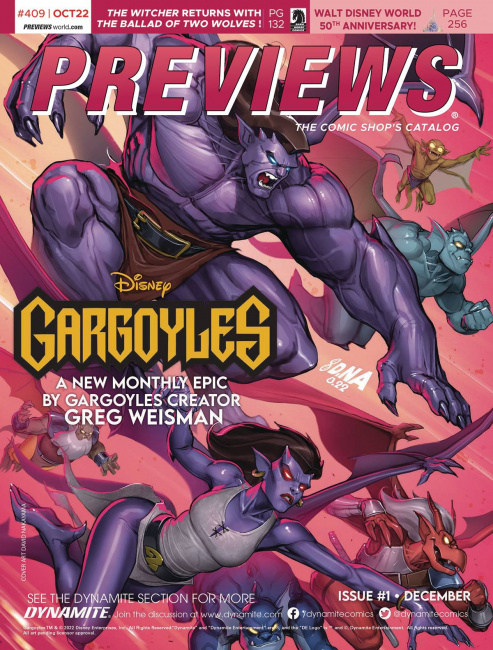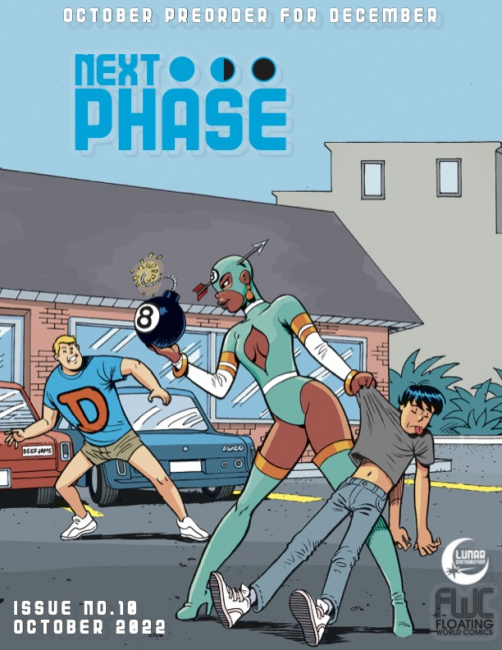The direct market stayed healthy throughout the pandemic, but it also got more complicated, as new comics distributors opened up to challenge Diamond’s dominance of the market. At the ICv2 Insider Session about comics distribution, Diamond Comic Distributors Chief Sales and Service Officer Chris Powell and Lunar Distribution Co-Founder Christina Merkler sat down with ICv2’s Milton Griepp to discuss the recent changes and how distributors can better support retailers.
Comic shops came through the COVID-19 pandemic surprisingly well, Powell said. “Our channel performed better than almost any other I’ve interacted with or even looked into,” he said. He credited both the retailers, who were quick to pivot to curbside pickup and delivery models in the early part of the pandemic, and the customers, who were still hungry for entertainment. Diamond also made some adjustments. “At the end of the process, we’ve come out of it with stores that are even stronger than before COVID,” he said.
Merkler said that over 275 new stores opened in the first six months of 2021, mostly brick-and-mortar or online-only.
In terms of the new challenges that retailers face now, Powell pointed out that having multiple distributors means that retailers have to develop systems to track orders across all of them. This is complicated by the supply chain situation: “Retailers are dealing with things they ordered a year ago that are just now showing up,” he said. “Do they still want it? Does the customer still want it?” Compounding this is the problem of inflation, which impacts retailers at home and at work, with the price of rent, utilities, and supplies all rising.
Merkler agreed that rising costs were a big factor. “I don’t know anyone right now who isn’t paying people twice what they were paying three years ago,” she said, “and if you’re not, you’re probably not keeping people.” While the industry is in a period of growth, she said, that won’t last forever, and it’s important that retailers determine the most efficient way to run their business, so that if something such as the pandemic happens again, and revenue drops sharply for a few months, retailers will be ready.
Comic shops also have to compete with streaming, games, and other forms of entertainment, and for Merkler, the key is to “just be better.” “We have to be more appealing, we have to be more convenient, and we have to have a value proposition,” she said. Powell pointed to the importance of building stores into community hubs, and part of that is to diversify across the hobby tier, carrying more than just a narrow selection of print periodicals.
Powell and Merkler differed most sharply on the question of whether a monthly catalog with a two-month lead time was really serving the needs of a market where retailers make their ordering decisions on a weekly basis and customers get most of their information online.
“Obviously, I’m biased, with 40 years of Previews magazine,” Powell said, “but we still have 30,000 people buy it every month.” Many retailers do still structure their business around monthly preorders, he said, even if it isn’t their entire business, and that can work well for customers too: “Getting customers to come in every week to come in every week to place orders is more of a challenge sometimes than saying ‘Here’s a catalog, here’s a deadline,’” he said. Diamond can accommodate products that don’t follow the usual cycle, he added, pointing to the Frank Miller Presents products as an example, but when products move out of the catalog, sales tend to drop. Furthermore, putting a range of products in a single catalog makes it easier for retailers to carry a diverse line, and publishers have time to tweak a product that gets initial negative reactions.
“Honestly, I am not a fan of the print catalog,” said Merkler. “I think it’s cumbersome.” While her retail store still sells them to customers, Lunar takes a different approach. “I still find value in a monthly catalog,” she said. “I just think it should be fully digital, available to every consumer to be able to see and available to every retailer to get listing and to provide to their customers.”
Merkler also pointed to the disconnect between the book market, which puts out solicits six months in advance, and the two-month cycle of comics catalogs. Still, a catalog creates hype, and if there were no catalog, customers who buy Batman every month wouldn’t stop. “I think it would affect the independent publishers,” she said, “and those are the publishers we want to help grow the market, because they have more opportunity.” Merkler and Powell did both note that many graphic novels are solicited six months in advance, and that the information is in the database even if it’s not in a specific catalog.
As to the future of comics retailing, Powell foresees greater diversity, with comic shops carrying a mix of current titles, back issues, toys, and other merchandise. While he acknowledged that not every retailer wants to do that, he pointed out that distributors can take different paths as well. “We have other distributors that are print only for the most part,” he said, “whether that’s periodicals and collections [or] just collections… Those are valid choices. We made the decision a long time ago that we were going to carry everything that we can carry that we and our retailers can sell profitably. The goal is to sort of be a one stop shop for those products.”
Merkler favored more diversity, so that everyone who wants to run a comic shop can do it in their own way. “We love people who want community hubs,” she said. “We love people who want an online only store that can market to people who don’t have a store within an hour and a half radius. We encourage diversification of course. But sometimes if you’re really good at one thing, then stick with it.” In addition, she sees a strong future in getting comics into other types of stores that have a similar customer base, and in that case, comic shops could become a resource for other retailers.
Source: ICV2







